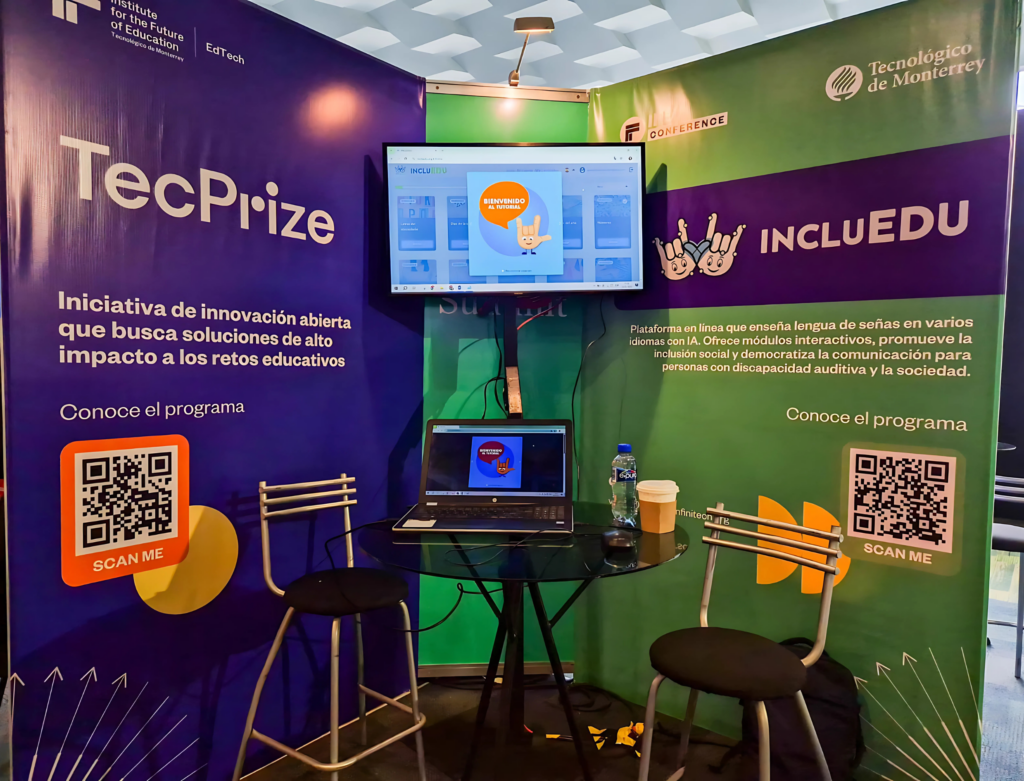
February 24, 2025
According to the WHO, around 40 million people in Latin America and the Caribbean suffer from disabling hearing loss. This represents a challenge for a large population that must face various barriers in their daily lives.
In an increasingly digitized world, technological exclusion represents a significant barrier to full participation in society. However, the resources to address these needs of a population that requires attention are still scarce, being innovation with a social focus one of the main agents of change.
Given this, the Peruvian startup Incluedu, founded by Giannina Honorio Heredia and Stev Mayuri, is breaking paradigms by using artificial intelligence (AI) to transform the teaching of sign language, promoting inclusive education and reducing the communication barriers faced by deaf people.
To date, the company has been funded by self-investment with a strong belief in its product and its impact. The founders have bet everything on Incluedu with confidence in its capacity for social transformation. However, they have also been recognized for acceleration and educational innovation programs.
Recently the startup was a finalist in TecPrize, an educational innovation competition organized by the Tecnológico de Monterrey, which has allowed them to connect with strategic allies.

The story of Incluedu was born out of an urgent need: the lack of access to effective tools for learning sign language. The company’s director, Giannina Honorio, who has worked for years with the deaf community, told Contxto about the beginning of this project that started with a case that marked her path.
“I met a girl with hearing loss whose family and teachers needed to learn sign language quickly to support her. However, the process was slow, expensive and relied on interpreters, who were not always available. That motivated me to look for a technological solution that could speed up the learning process and make it accessible to everyone,” said Honorio.
“With Incluedu, we want to democratize access to sign language and empower people to communicate effectively.”
Incluedu uses computer vision and AI algorithms to recognize, correct and evaluate users’ signs in real time. Through a virtual instructor, students receive instant feedback, which streamlines the learning process and makes it more interactive. “Thanks to AI, we have managed to transform the traditional teaching of sign language, making it dynamic and accessible from any device with a camera, such as cell phones, tablets or laptops,” she explained.
In addition, the platform is adaptable to the linguistic variants of each country. “Sign languages are not universal; each region has its own particularities. That’s why we work with deaf leaders and interpreters in each country to ensure that our algorithm is accurate and culturally relevant,” she adds.
The development of Incluedu has not been without its challenges. On a technical level, training the AI models to recognize three-dimensional gestures and regional variations required significant effort. “Sign languages are visual and complex, which forced us to develop highly accurate algorithms,” says Honorio.
On the cultural side, the diversity of sign languages represented another challenge. “In Peru we use Peruvian sign language, but in Mexico, Chile and Spain there are different versions. Adapting our platform to these variants has been a constant learning process,” she says.
Incluedu is not only transforming education in Peru, but is also expanding to other markets. “We are already coordinating with institutions in Mexico, Chile, Colombia and the U.S., and we have received interest from Turkey and Central America,” says the director.
The startup has also established strategic alliances with governments and organizations to promote inclusion. “We work with ministries of education and government ministries to integrate Incluedu into the education and labor systems. Our goal is that anyone, anywhere in the world, can learn sign language in an accessible and effective way,” she says.

Incluedu has managed to balance its social mission with a sustainable business model. “Inclusion is not only a right, but an opportunity for innovation and growth,” Honorio comments. “We offer the platform at an affordable price of $10 per month, with official certifications that validate learning.”
In the long term, Incluedu’s vision is ambitious: “We want to be the reference platform for sign language learning in the world, reducing the communication gap in education, employment and services. Inclusion is not an individual effort, but a collective one, and we are committed to leading this change,” she concludes.
Incluedu is an inspiring example of how technology can be a powerful tool for social inclusion. With its innovative approach and commitment to the deaf community, this Peruvian startup is changing lives and redefining the future of inclusive education.

Por Stiven Cartagena
July 25, 2025